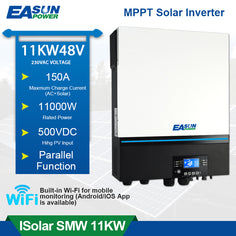Understanding the Basics of Solar Inverters for Homes in the None Industry
Body
As the world increasingly turns to renewable energy sources, the solar inverter for home has become a crucial component in residential solar power systems. This article aims to provide a deep understanding of solar inverters, their importance, and how they function within home solar systems.

What is a Solar Inverter for Home?
A solar inverter for home is a device that converts the direct current (DC) electricity generated by solar panels into alternating current (AC) electricity, which can be used by household appliances. Without this conversion, the energy harnessed from the sun would be unusable in most home settings.
Types of Solar Inverters
There are several types of solar inverters available for home use, each with its own advantages and applications:
- String Inverters: These are the most common type of inverters used in residential solar systems. They are cost-effective and reliable.
- Microinverters: Installed on each solar panel, microinverters offer better performance in shaded conditions and allow for panel-level monitoring.
- Hybrid Inverters: These inverters can manage both solar power and battery storage, making them ideal for homes with energy storage systems.
How Does a Solar Inverter Work?
The primary function of a solar inverter for home is to convert DC electricity into AC electricity. This process involves several steps:
- The solar panels capture sunlight and convert it into DC electricity.
- The DC electricity is sent to the inverter.
- The inverter converts the DC electricity into AC electricity.
- The AC electricity is then used to power household appliances or is fed back into the grid.
Importance of Solar Inverters
Solar inverters play a critical role in the efficiency and safety of a home solar system. They ensure that the electricity generated is compatible with household appliances and the grid. Additionally, modern inverters come with monitoring capabilities, allowing homeowners to track their energy production and consumption.
"A solar inverter is the heart of a solar power system, ensuring that the energy harnessed from the sun is effectively utilized in homes."
Choosing the Right Solar Inverter for Your Home
When selecting a solar inverter for home, consider the following factors:
- System Size: Ensure the inverter can handle the total output of your solar panels.
- Efficiency: Look for inverters with high efficiency ratings to maximize energy conversion.
- Warranty: A longer warranty period can provide peace of mind and indicate the manufacturer's confidence in their product.
For instance, the Solar Inverter 123 offers high efficiency and a robust warranty, making it a popular choice among homeowners.
Installation and Maintenance
Proper installation and regular maintenance are essential for the optimal performance of a solar inverter. It is advisable to hire a professional installer to ensure that the inverter is correctly set up and integrated with your solar panels and electrical system. Regular maintenance checks can help identify and resolve any issues early, ensuring the longevity and efficiency of your system.
Conclusion
Understanding the basics of a solar inverter for home is crucial for anyone considering a residential solar power system. By choosing the right type of inverter and ensuring proper installation and maintenance, homeowners can maximize the benefits of solar energy, reduce their carbon footprint, and enjoy significant savings on their energy bills.
For more detailed information, you can watch this comprehensive video guide on solar inverters.
References











Comments